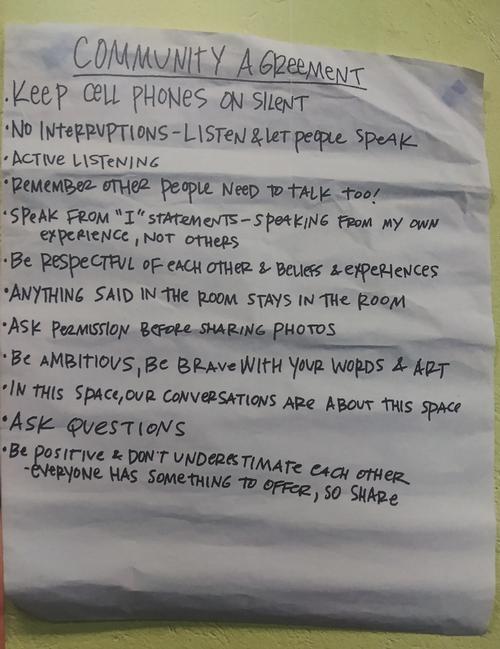Have you heard that Tommy Orange’s breathtaking novel There There is the 2020 One Book, One Philadelphia featured selection? If you don’t have a copy yet, don’t worry: the Free Library has over 400 copies available to borrow, as well as downloadable audiobook and ebook editions. Free copies of the book will also be given out at every neighborhood library book discussion! Check one out today and join the rest of Philadelphia as we progress through the reading period, which runs now through January 22.
As you read, you may wish to discuss There There with a friend, neighbor, coworker, or relative who’s also making their way through the novel—or get ready for one of the many group book discussions that will occur across Philadelphia during the One Book programming season: eight inspiring weeks of conversations, workshops, film screenings, poetry readings, community panels, and more, all based on the themes of There There. The programming season will take place from January 22 to March 18.
What, though, are the themes of There There, and how can we discuss them with each other thoughtfully? In last week’s #OneBookWednesday post, we examined some key historical events referenced in the book, as well as some of its most important terms; take a look and share it with others who are reading There There. Consider, too, these broader themes and related questions.
- Storytelling
There There is a polyphonic novel, written from the perspectives of many voices. Why do you think the author made this structural choice? How does this relate to Dene Oxendene’s storytelling project, and why is storytelling important to the survival of a community?
- History and the Creation of Historical Narrative
Orange frequently references the difference between mainstream understandings of the history of the United States and Native understandings of that same history. What version of that history are you familiar with? What are some of the ways that certain historical narratives are perpetuated, while others are hidden?
- Gentrification
Gentrification is the process of changing the built environment of a place so that property values can be raised, often resulting in the displacement of that place’s long-term inhabitants and communities. In the novel, gentrification is frequently discussed in relation to Oakland, California, where the powwow is set to occur. What parts of Oakland are depicted in the novel? How does the city’s gentrification affect the characters and their attitudes toward home and stability? What are some of the relationships between gentrification and race that the book discusses?
- Ancestry and Heritage
Almost all of the books’ main characters are descendants of Indigenous peoples of North America. Which characters seem to be interested in connecting with their Native ancestry? What are some of the different ways they practice those connections?
Community agreement, 2019 Friends, Peace, and Sanctuary Project.
Reading together also means listening together. If you’re discussing There There with a group, try one or more of these tips for making every member of your conversation feel recognized and heard.
- Start conversations with an open-ended question, such as, "How has everyone’s day been so far?" Encourage participants to go around in a circle and share whatever they like. This can help establish the conversation as a dialogue between individuals who are all bringing different, equally valid feelings to the table that may affect how they participate.
- Suggest that everyone propose a "community agreement": a collective vision for how everyone in the group wants to be in relationship with one another. The group can then decide which agreements to adopt, allowing the group to create consensus around shared norms. Example agreements are: "Listen while someone else is talking," "Make sure everyone has the chance to speak," "Respond, don’t react."
- Open a space at the beginning of the conversation for people to share what topics are difficult for them to discuss. Be aware of these possible triggers throughout the discussion and help create a safe environment for all to speak and listen.
- Ask everyone to reflect on whether they are usually a talker or a listener, and encourage them to challenge that idea they have about themselves in the ensuing conversation.
- Speak with "I" statements—that is, from personal experience—as much as possible, instead of generalizing.
- If you have a large group, consider appointing a moderator. One example of moderation involves people raising their hands to speak; the moderator writes down the order in which people have raised their hands, and calls on them in that order. This allows people to gain the chance to speak without having to talk over other people.
For more depth, some great ideas for community agreements, and other considerations regarding how to talk, listen, and take care of ourselves and each other around spaces of dialogue, take a look at the Anti-Oppression Network’s "Safer Space Policy/Community Agreements" resource.
And don’t forget to mark your calendars for the One Book, One Philadelphia Kickoff Event with Tommy Orange on Wednesday, January 22, 2020, at the Parkway Central Library’s Montgomery Auditorium at 7:30 p.m.
Have a topic or tip to share? Add it to the comments below!
Have a question for Free Library staff? Please submit it to our Ask a Librarian page and receive a response within two business days.


